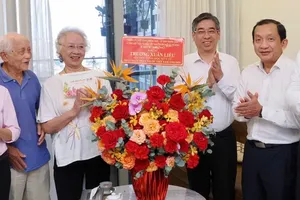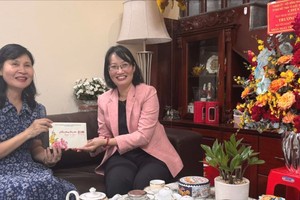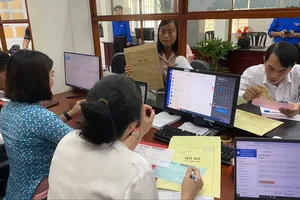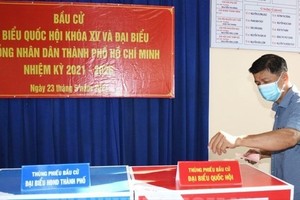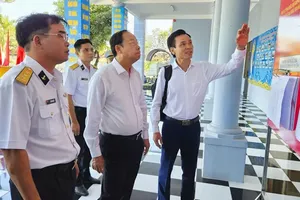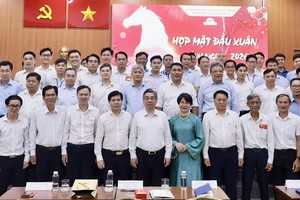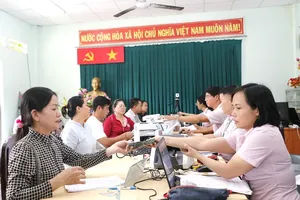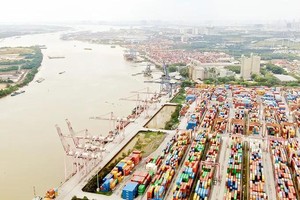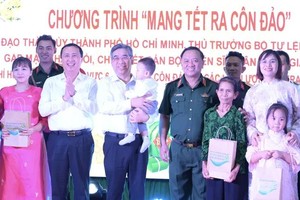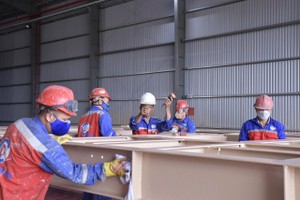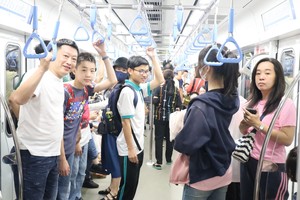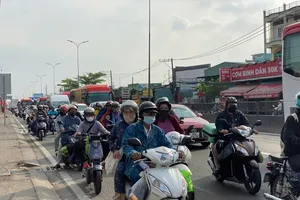
Significant momentum
Ha Minh Nhut, a Judicial and Civil Status official from Da Kao Ward in District 1, adeptly handles documents on the integrated digital system between the commune and city levels. Thanks to extensive experience with the National Public Service Portal, these operations are routine for him and his colleagues.
As HCMC launches its two-tier local government model, Nhut is slated for a position at the new Saigon Ward Public Administration Service Center. He is confident in this new assignment, anticipating that his existing familiarity with the public service portal will streamline task resolution. He is also committed to continuous learning through specialized training to effectively manage new responsibilities being devolved from the district level, ensuring better service for the populace.
Other civil servants working at commune level in HCMC have already been oriented with new applications and undergoing procedural training facilitated by the city as well as its various departments and sectors. Beyond participating in the city-guided trial operations, these people have also taken the initiative to independently research and enroll in courses to enhance their digital competencies.
Chairman Nguyen Tran Binh of the District 11 People’s Committee stated that in preparation for the operational launch of the two-tier system, the district has meticulously assigned and deployed a team of officials and civil servants from its specialized departments to work in conjunction with ward-level civil servants at the Public Administration Service Center. Furthermore, the district has reviewed all internal operational protocols between divisions and individual civil servants within the center to ensure the seamless and uninterrupted flow of work.
It is projected that each ward-level Public Administration Service Center will be staffed by 12 to 16 civil servants to manage the full spectrum of administrative procedures. The district is also collaborating closely with the HCMC Digital Transformation Center to conduct comprehensive training for leadership personnel designated for key roles within the new centers, as well as for the specialized district and ward staff assigned to these facilities.
Other districts are carrying out similar training tasks in hope of better equipping civil servants with necessary skills to perform their duty flawlessly during this critical period of administrative restructuring.
Meticulous preparation for a seamless transition
According to the draft Law on Local Government, over 1,065 tasks currently managed at the district level are slated for transfer to the commune level. Dr. Nguyen Duc Quyen of the HCMC Cadre Academy contends that successfully shouldering these new responsibilities necessitates that officials possess a profound understanding of each specific field.
Consequently, he suggests that every commune and ward must devise a phased operational roadmap to adapt to this expanded portfolio of duties. This involves categorizing tasks into distinct groups of public administration tasks (e.g., issuance of documents, authentication), specialized management tasks (e.g., land, construction, healthcare), and tasks pertaining to security, order, and social welfare.
Following this classification, a swift and targeted training initiative must be rolled out for officials and civil servants based on these task groups, fostering a paradigm shift from a management-centric to a service-oriented mindset. The objective is for 100 percent of officials to achieve proficiency in using specialized software, online public services, and electronic document management systems.
Chairman Nguyen Van Duc of District 12 confirmed officials in the district have been trained on new IT systems, the public service portal, and AI. Concurrently, the municipal Party Committee’s Organization Commission is coordinating broader training, deploying officials to central government programs and specialized courses at the HCMC Cadre Academy for comprehensive preparation.
Head Van Thi Bach Tuyet of the HCMC Party Committee’s Organization Commission, further elaborated that to ensure the commune-level administrative apparatus functions seamlessly from July 1, the city will expedite the assignment of key officials to various wards and communes to spearhead the implementation efforts.
With the impending transition to a two-tier local government structure, the critical issues of decentralization and the delegation of authority have come to the forefront. The central question is how to most effectively resolve administrative procedures and handle matters that directly impact citizens and businesses.
Following a working session with all districts and Thu Duc City, the HCMC Party Committee’s Standing Committee has issued specific directives to manage the new government structure. It has tasked the HCMC People’s Committee with promptly issuing its own directives on decentralization, clearly delineating authority between commune-level People’s Committees and their chairpersons.
This aims to bolster leadership accountability and explicitly prevent buck-passing, avoidance, and delays in executing mandated tasks. Furthermore, the directive mandates a comprehensive decentralization review across all relevant agencies to ensure consistency and eliminate any mission gaps or overlaps. The final handover must be executed with precision, ensuring a seamless transition with no interruption of public services.
No citizen or business to wait more than 20 minutes for administrative service
The HCMC People’s Committee recently issued a directive from its Chairman Nguyen Van Duoc, concerning the reception and resolution of administrative procedures amidst the reorganization to a two-tier local government apparatus.
The Chairman has assigned the Department of Science and Technology the responsibility of publicizing dedicated telephone hotlines, whose duty is to provide consultation, support, and a channel for inquiries, feedback, and recommendations regarding the execution of administrative procedures at the new commune and ward Public Administration Service Centers.
The People’s Committees of all districts and Thu Duc City are instructed to proactively coordinate with the Department of Home Affairs to implement the two-tier government model and the restructuring of commune-level administrative units in strict accordance with regulations. They are also tasked with developing a plan to consolidate their one-stop-shops, ensuring that the provision of administrative services is not constrained by geographical boundaries under the new model.
Localities must proactively arrange the number and placement of service counters to align with the practical conditions and circumstances at each new commune-level Public Administration Service Center. This arrangement must be logical and convenient for citizens and businesses, and under no circumstances should it lead to overloading or require individuals to wait longer than 20 minutes to submit their administrative applications.

